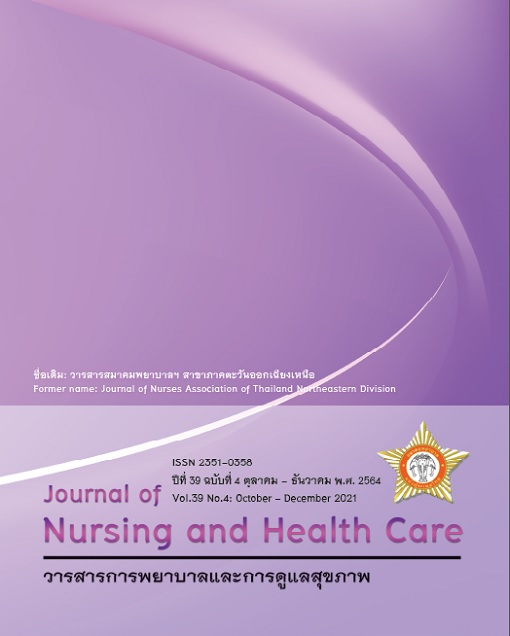เครื่องมือคัดกรองภาวะสมองเสื่อมที่เหมาะสมสำหรับผู้สูงอายุไทย
คำสำคัญ:
เครื่องมือคัดกรอง ภาวะสมองเสื่อม ผู้สูงอายุบทคัดย่อ
การวิจัยเชิงบรรยาย เพื่อศึกษาเครื่องมือที่เหมาะสมในการคัดกรองภาวะสมองเสื่อมในผู้สูงอายุ กลุ่มตัวอย่างเป็นผู้ที่มีอายุ 60 ปีขึ้นไปที่อาศัยในชุมชนพื้นที่จังหวัดฉะเชิงเทราและจังหวัดนครราชสีมา เก็บข้อมูลระหว่างเดือนมกราคม-มิถุนายนพ.ศ.2561 เครื่องมือการวิจัยประกอบด้วย 1) การคัดกรองสำหรับอาสาสมัครสาธารณสุข คือ แบบทดสอบ 14 ข้อคำถาม, Mini-Cog, IQCODE-Modified, 2) การคัดแยกภาวะสมองเสื่อมจากบุคลากรทางสุขภาพ โดยใช้ AMT, Mini-Cog (S.Borson) ชุดที่ 1 และ 2, MMSE Thai-2002 และ MoCA และ 3) การวินิจฉัยของแพทย์ ผลการศึกษาพบว่ามีผู้สูงอายุได้รับการคัดกรองภาวะสมองเสื่อมจำนวน 765 คน โดยร้อยละ 5.5 ได้รับการวินิจฉัยว่ามีภาวะสมองเสื่อม ร้อยละ 85.9 มีภาวะการรู้คิดบกพร่องเล็กน้อยและร้อยละ 8.6 ไม่พบปัญหาความจำ แบบทดสอบ 14 ข้อคำถาม มีค่าความเชื่อมั่นสูงสุดคือ 0.928 แบบทดสอบ Mini cog มีค่าความเชื่อมั่นต่ำสุดคือ 0.340 เมื่อพิจารณาค่าความไวของแบบทดสอบคัดกรองภาวะสมองเสื่อม (IQCODE) มีค่าสูงสุดคือ 0.579 ส่วนแบบประเมิน Mini-Cog (S.Borson) ชุดที่ 2 มีค่าความไวสูงสุดคือ 0.968 ดังนั้นการเลือกใช้เครื่องมือคัดกรองภาวะสมองเสื่อมต้องพิจารณาตามบริบทและความเหมาะสมของพื้นที่ ผู้นำใช้เครื่องมือการคัดกรองทั้งในระดับวิชาชีพ และอาสาสมัครในชุมชนต้องได้รับการอบรมและฝึกปฏิบัติการใช้เครื่องมือก่อนนำใช้จริงในพื้นที่
Downloads
เอกสารอ้างอิง
1. American Psychiatric Association (APA). Neurocognitive Disorder. In Diagnostic and Statistical Manual of Mental Disorder, 5th edition. Washington, DC: American Psychiatric Association, Thailand; 2013.
2. Krairit O, Chansirikarn S. Dementia: Near disaster in Thai health 2007. Institute for Population and Social Research Mahidol University. Bangkok: Amarin Printing and Publishing Company, Thailand; 2007.
3. Meenanan S. Alzheimer's: A cost that the state should help bear. Health Intervention and Technology Assessment Program Booklet 2009; 2(6): July-September 2009.
4. Ferri CP, Prince M, Brayne C, Brodaty H, Fratiglioni L, Ganguli M, et al. Global prevalence of dementia: A Delphi consensus study. Lancet 2005; Dec 17; 366(9503): 2112 -2117.
5. Aekplakorn W. Report of the 4th Thai People's Health Survey by Physical Examination 2008-2009. Thai Health Survey Office. Bangkok: The Graphico Systems Company Limited, Thailand; 2010.
6. Foundation of Thai Gerontology Research and Development institute (TGRI). Situation of the Thai Elderly 2018. Institute for Population and Social Research, Mahidol University and Foundation of Thai Gerontology Research and Development institute (TGRI). Nakorn Pathom: Printery Co., Ltd. Thailand; 2017.
7. Foundation of Thai Gerontology Research and Development institute (TGRI). Situation of the Thai Elderly 2020. Institute for Population and Social Research, Mahidol University and Foundation of Thai Gerontology Research and Development institute (TGRI). Nakorn Pathom: Printery Co., Ltd.; Thailand; 2019.
8. Wilson RS, Scherr PA, Scheider JA, et al. Relation of cognitive activity to risk of developing Alzheimer disease. Neurology 2007; 69: 1991-1920.
9. Lorentz WJ, Schanlan JM, Borson S. Brief screening tests for dementia. The Canadian Journal of Psychiatry 2002; 47(8): 723-733.
10. Institute of Geriatric Medicine, Department of Medical Services. Elderly Screening/Assessment Manual. 2nd edition. Office of the Publishing House for the Veterans Organization, Thailand; 2015.
11. Institute of Geriatric Medicine, Department of Medical Services. Practice guidelines of comprehensive care management for older person with dementia. Institute of Geriatric Medicine, Department of Medical Services, Thailand; 2019.
12. Kusalaruk P, Nakawiro D. A validity Study of the Mini-Cog Test in Thai Dementia Patients. Ramathibodi Medical Journal (RMJ) 2012; 35: 264-271.
13. Siri S, Okanurak K, Chansirikanjana S, Kitiyaporn D, Jorm AF. Modified informant questionnaire on cognitive decline in the elderly (IQCODE) as a screening test for dementia for Thai elderly. The Southeast Asian Journal of Tropical Medicine and Public Health 2006; 37(3): 587-594.
14. Kusalaruk P, Nakawiro D. A validity study of the Mini-Cog test in Thai dementia patients. Ramathibodi Medical Journal (RMJ) 2012; 35: 264-271.
15. The Committee prepared the Preliminary Brain Test, Thai version, 1999. Mini Mental Examination Thai-2002, MMSE-2002. Bangkok: Institute of Geriatric Medicine, Department of Medical Services, Ministry of Public Health, Thailand; 2002.
16. Hemrungrojn, S. Montreal cognitive assessment (MoCA). [database on the Internet]. 2011. [cited 2014 August 31]. Retrieved from https://www.mocatest.org/pdf_file/test/MoCA-test-thai-pdf.
17. Wongpakaran N, Wongpakaran T, Reekum RV. The use of GDS-15 in detecting MDD: A comparison between residents in a Thai long-term care home and geriatric outpatients. Journal of Clinical Medicine Research 2013; 5(2): 101–111.
18. Hodkison HM. Evaluation of a mental test scores for assessment of mental impairment in the elderly. Age Ageing 1972 November; 1(4): 233-238.
19. Jitapunkul S, Pillay I, Ebrahim S. The abbreviated mental test: its use and validity. Age Aging. 1991 September; 20 (5): 332-336.



